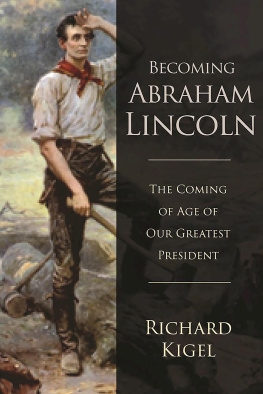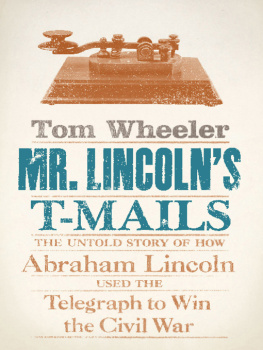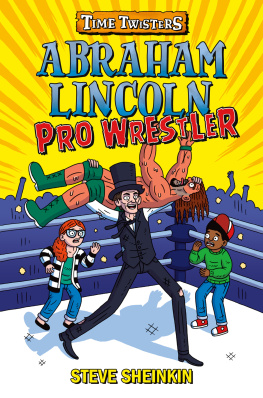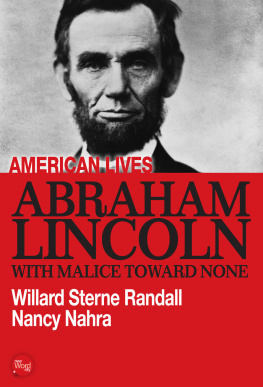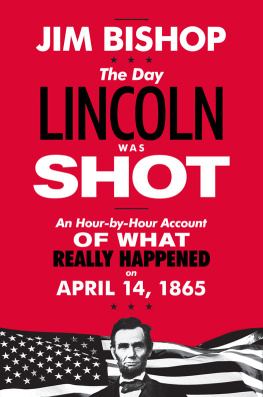Copyright 2017 by Richard Kigel
All rights reserved. No part of this book may be reproduced in any manner without the express written consent of the publisher, except in the case of brief excerpts in critical reviews or articles. All inquiries should be addressed to Skyhorse Publishing, 307 West 36th Street, 11th Floor, New York, NY 10018.
Skyhorse Publishing books may be purchased in bulk at special discounts for sales promotion, corporate gifts, fund-raising, or educational purposes. Special editions can also be created to specifications. For details, contact the Special Sales Department, Skyhorse Publishing, 307 West 36th Street, 11th Floor, New York, NY 10018 or .
Skyhorse and Skyhorse Publishing are registered trademarks of Skyhorse Publishing, Inc., a Delaware corporation.
Visit our website at www.skyhorsepublishing.com.
10 9 8 7 6 5 4 3 2 1
Library of Congress Cataloging-in-Publication Data is available on file.
Jacket design by Rain Saukas
Jacket illustration: Lincoln the Rail Splitter , J. L. G. Ferris
Print ISBN: 978-1-5107-1730-5
Ebook ISBN: 978-1-5107-1731-2
Printed in the United States of America
Dedication

W hile I was teaching in Brooklyn, I went hunting for books about famous people who came from dire poverty but, through their passion for reading and learning, educated themselves and made their mark in the world. The first person I thought of was Lincoln. I looked but found no books on Lincolns young manhood in backwoods America that described in detail how he picked up his extraordinary reading and writing skills.
As C. S. Lewis once said to J. R. R. Tolkien, If they wont write the kind of books we want to read, we shall have to write them ourselves.
This book is dedicated to students everywhere who, like Lincoln, find themselves stuck in an atmosphere with absolutely nothing to excite ambition for education, and still they come to school, eager to learn, determined to excel, and willing to work.
Lincoln himself knew the power of words and saw a kind of magic in their vast reach. Words transcend barriers, enabling us to exchange thoughts with one another and converse with the dead, the absent and the unborn, at all distances of time and space.
If we can isolate the one quality that made Lincoln great, it would be his hunger for reading. The things I want to know are in books, he said. My best friend is the man who will get me a book I aint read.
Richard Kigel
Table of Contents

My childhoods home I see again,
And sadden with the view;
And still, as memory crowds my brain,
Theres pleasure in it too.
O Memory! Thou midway world
Twixt earth and paradise,
Where things decayed and loved ones lost
In dreamy shadows rise.
Abraham Lincoln, 1844
Preface

B ecoming Abraham Lincoln is biography at its purest. The story of Abraham Lincoln is told by those most qualified to tell it: the men and women who knew Lincoln in Kentucky, Indiana, and Illinois from the day he was born until he turned twenty-five.
This biography uses only primary source material that historians regard as authentic, observations and statements by individuals who were in a position to tell us what they saw and heard. Here are the actual words of those who grew up with Lincolnhis friends and family. They are the real eyewitnesses to history.
A note about the quotations and sources: most of the statements were collected by William Herndon, Lincolns law partner and friend, in the years following Lincolns death. The responses came in original handwritten letters and transcribed interviews. Because of the low literacy levels of many of his subjects, sometimes these statements are difficult to understand. Often they used no punctuation and wrote in fragments of thoughts. Misspellings were common and names and places were often confused. Lincoln was sometimes spelled Linkhorn or Linkern. Lincolns grandmother Lucy was sometimes Lucey. Some respondents referred to themselves in the third person. Lincoln himself did in his biographical writings.
In the nineteenth century there were no standards in journalism. It was up to each writer to determine how to present the material. The result can be jarring and inconsistent. Sometimes, Lincolns cousin Dennis Hanks sounds like an uneducated country bumpkin and other times like an eloquent diplomat. This is entirely due to differences in literary technique of the writer. Some interviewers who reported on his words prioritized clarity, so they sanitized his language. Other interviewers sought to convey his habitual language patterns and dialect. All of it was perfectly acceptable to nineteenth-century readers.
In spite of all these difficulties, we are able to obtain a vivid, authentic account of Lincolns childhood and adolescence in the actual words of those who knew him best. We see Lincoln as he was, according to law partner Billy Herndon, just as he lived, breathed, ate and laughed in this world.
Suppose we could gather all those who knew Lincoln as a child and young man together in one room. We would certainly question them: What was Abraham Lincoln like? What did he say? What did he do? Their observations and statements quoted here would most likely be the words they use when they tell us what they know about Abraham Lincoln.
I NTRODUCTION
I saw him this morning about 8:30.

W hen Walt Whitman went to Washington, DC, in 1862 to find his brother, a Union soldier wounded at the Battle of Fredericksburg, he ended up staying for two years. Visiting battlefield camps and field hospitals, he served as a compassionate nurse, tending to the sick, wounded, and dying, handing out fruit, sweets, and plugs of tobacco to Union and Rebel soldiers and civilians black and white. He talked to them, read to them, and helped them write letters to their loved ones. He stayed with them at night so they would not be alone in their agony.
From the first I kept little notebooks for impromptu jottings in pencil, Whitman wrote.
Whitman wanted America to know the devastating price paid by the American soldier. Future years will never know the seething hell, he wrote.
Whitman was a newspaperman, editor of the Brooklyn Daily Eagle and the Brooklyn Times . My idea, he said, is a book of the time, worthy of the time.
Often while walking near the White House, Whitman would see President Lincoln passing by. A hoosier Michel Angelo, he wrote, so awful ugly it becomes beautiful, with its strange mouth, its deep-cut criss-cross lines and its doughnut complexion.
Whitman described one of these momentary encounters in his notebook. On August 12, 1863, he wrote:
I see the President almost every day as I happen to live where he passes to and from his lodgings out of town. I saw him this morning about 8:30 coming in to business, riding on Vermont Avenue near L Street. He always has a company of twenty-five or thirty cavalry with sabers drawn and held upright over their shoulders. Mr. Lincoln on the saddle generally rides a good sized, easy going gray horse; is dressed in plain black, somewhat rusty and dusty; wears a stiff black hat and looks about as ordinary in attire, etc. as the commonest man.

